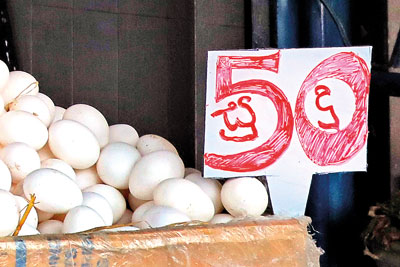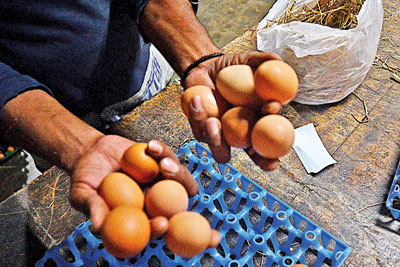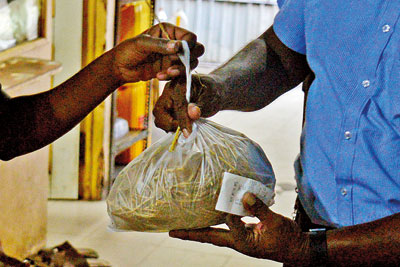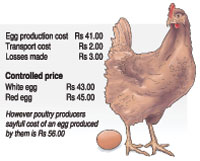News
Shortages, cost pressures make eggs crisis a hard one to crack
View(s):By Kasun Warakapitiya
The festive period is approaching and families are having to bear a shortage of eggs and a price tag of up to Rs 68 each, that makes the source of protein a luxury when the cost of living is at dizzying levels.
Retailers are disregarding price controls for white and brown eggs imposed by the regulator and the poultry industry says it is grappling with high production costs.
The Consumer Affairs Authority (CAA) had gazetted the price at Rs 43 for a white egg and Rs 45 a brown one, respectively. 
Eggs are an essential ingredient in Christmas cakes, puddings and other festive preparations.
Bakery and eatery operators complain there is not enough supply.
The president of the Bakery Owners Association, N.K Jayawardena told the Sunday Times that most have stopped making cakes and have reduced the production of buns, pastries, and rolls, using eggs.
He said only 50% of the egg requirement is available in the market and merchants are exploiting the situation.
Mr Jayawardena said bakers and confectionery manufacturers need a large volume of eggs and have been forced to buy at high prices.
A retailer said he cannot sell eggs for prices mandated by the regulator.
Wattala retail shop owner, Kumari Liyanage told the Sunday Times that she had decided to stop selling eggs. White eggs are not available for Rs 43, while brown eggs are out of stock at wholesalers. She fears the Rs 100,000 fine if the CAA raids her shop and produces her in court.

Retailers are disregarding price controls for white and brown eggs imposed by the regulator and the poultry industry says it is grappling with high production costs. Pix by Eshan Fernando
Egg producers have their own tale of woes.
One group said eggs cannot be sold at the controlled price, while others said they can produce eggs at the gazetted price.
One faction of egg producers said imported chicken feed ingredients, and higher water and electricity bills had forced them to raise prices.
They said the production of eggs and maintaining large flocks of birds were difficult when quality feed is unavailable.
The chairman of the All Island Poultry Farmers Association, Ajith Gunasekara said that although supply continued during the coronavirus disease pandemic, production has declined because of a feed shortage.
Prices of imported raw material for feed have risen and farmers have reduced the number of birds they raise and also use local feed. This means lower production of eggs.
Mr Gunasekara also said that when the egg producing parent population is reduced, poultry farmers are forced to raise younger birds, which need time to mature.
“Although we repeatedly explained our problems to the CAA, Trade Minister and President, we did not get a positive response. As we predicted, egg production dropped in November.’’
Another faction said production costs have dropped and they can produce eggs for less unlike a few large-scale producers who try to increase prices for profit.
All Island Egg Traders Association’s general secretary Anurasiri Marasinghe told a press conference in Kurunegala, that production cost remains between Rs 30 and Rs 40. Eggs can be sold wholesale for Rs 35 and for Rs 40 at retailers.
However, an independent producer who claimed anonymity, said it is not possible to sell eggs for Rs 40 as the production cost exceeds Rs 42.
When the cost of transport, wholesale and retail margins are added up, the eggs need to be sold for Rs 56
at least. 
Small-scale farmers also claimed that although large-scale producers who make their own chicken feed are able to profit, they themselves are can’t.
Vimukthi Devinda a poultry farmer who also produces chicken, said feed costs and electricity costs for incubators, deter the raising of new flock.
Despite price controls, traders sell for below Rs 50 temporarily.
The CAA has done more than 300 raids and filed 115 court cases against merchants who sold eggs above the controlled price. CAA has generated Rs 8 million from fines.
A senior CAA official, who claimed anonymity, said the gazette notice considered the trend of price reduction of raw material used in poultry feed. 
Following protests by producers, a grace period was given to sell eggs at a maximum of Rs 50 until the price of feed drops.
CAA chairman Shantha Niriella declined comment as some poultry farmer associations had filed cases against the authority.
Trade Minister Nalin Fernando said there are no plans to allow the poultry farmers’ request to raise the prices because feed costs are falling.
He said the gazetted price
will be imposed.
The best way to say that you found the home of your dreams is by finding it on Hitad.lk. We have listings for apartments for sale or rent in Sri Lanka, no matter what locale you're looking for! Whether you live in Colombo, Galle, Kandy, Matara, Jaffna and more - we've got them all!

